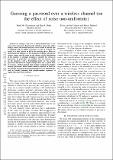Guessing a password over a wireless channel (on the effect of noise non-uniformity)
Author(s)
Christiansen, Mark M.; Duffy, Ken R.; Medard, Muriel; Calmon, Flavio du Pin
DownloadMedard_Guessing a.pdf (291.8Kb)
OPEN_ACCESS_POLICY
Open Access Policy
Creative Commons Attribution-Noncommercial-Share Alike
Terms of use
Metadata
Show full item recordAbstract
A string is sent over a noisy channel that erases some of its characters. Knowing the statistical properties of the string's source and which characters were erased, a listener that is equipped with an ability to test the veracity of a string, one string at a time, wishes to fill in the missing pieces. Here we characterize the influence of the stochastic properties of both the string's source and the noise on the channel on the distribution of the number of attempts required to identify the string, its guesswork. In particular, we establish that the average noise on the channel is not a determining factor for the average guesswork and illustrate simple settings where one recipient with, on average, a better channel than another recipient, has higher average guesswork. These results stand in contrast to those for the capacity of wiretap channels and suggest the use of techniques such as friendly jamming with pseudo-random sequences to exploit this guesswork behavior.
Date issued
2013-11Department
Massachusetts Institute of Technology. Department of Electrical Engineering and Computer Science; Massachusetts Institute of Technology. Research Laboratory of ElectronicsJournal
Proceedings of the 2013 Asilomar Conference on Signals, Systems and Computers
Publisher
Institute of Electrical and Electronics Engineers (IEEE)
Citation
Christiansen, Mark M., Ken R. Duffy, Flavio du Pin Calmon, and Muriel Medard. “Guessing a Password over a Wireless Channel (on the Effect of Noise Non-Uniformity).” 2013 Asilomar Conference on Signals, Systems and Computers (November 2013).
Version: Author's final manuscript
ISBN
978-1-4799-2390-8
978-1-4799-2388-5